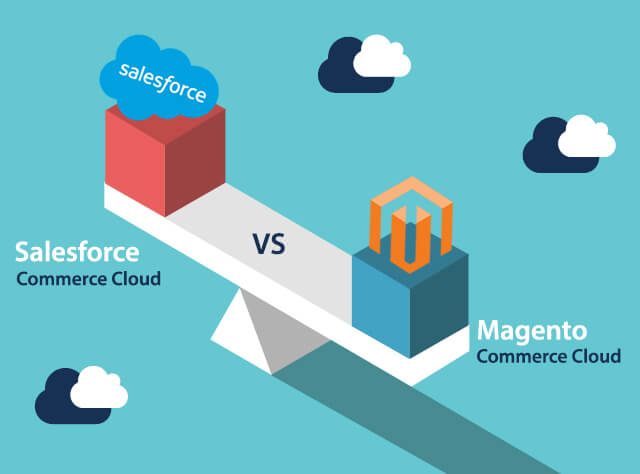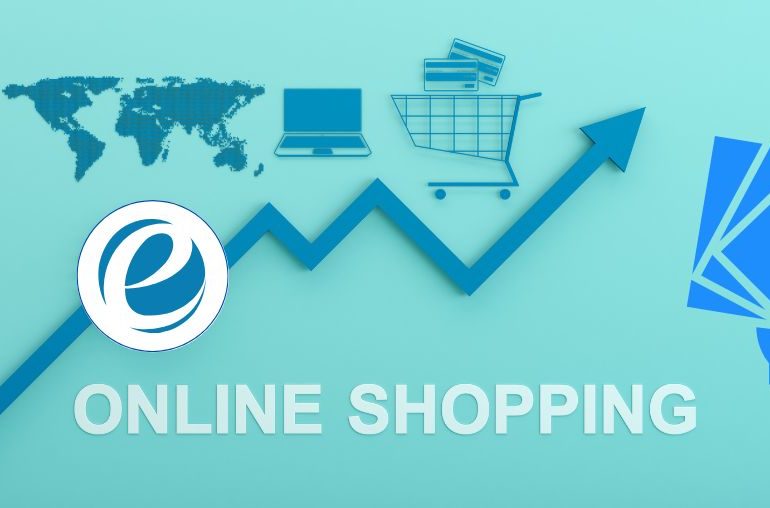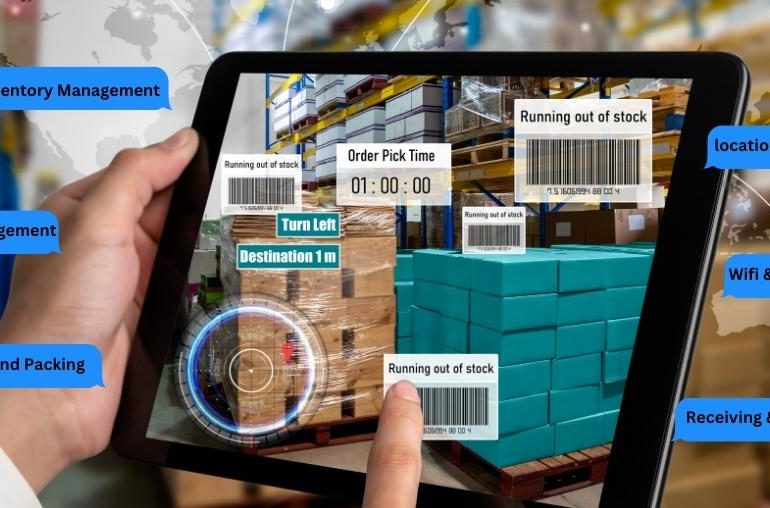Last Updated on January 21, 2022
Which ecommerce platform is better Magento commerce cloud or Salesforce commerce cloud? This hot debatable topic has created a massive rift among developers, merchants, and the official communities of Magento and Salesforce.
Both ecommerce platforms are one of the most sought-after cloud-based ecommerce platforms with robust and state-of-the-art features. While the Magento commerce cloud is the brainchild of Adobe solutions, the Salesforce commerce cloud is the latest and most ingenious creation of Salesforce that renders highly optimized ecommerce experience to merchants and users.
The one and the only way to settle down the debate of which cloud-based ecommerce platform is the best to run a full-fledged ecommerce platform is by painstakingly comparing both Magento commerce cloud and Salesforce commerce cloud on various parameters and aspects.
In this comprehensive blog post, we are going to state an all-inclusive comparison between the Magento commerce cloud and Salesforce commerce cloud that will help you to find out which cloud-based ecommerce platform is exemplary for you to run a scalable ecommerce business. Before we begin the comparison between two goliath platforms, it is quite imperative to know the key attributes and strengths of the Magento commerce cloud and Salesforce commerce cloud.
Principal Attributes and Strengths of Salesforce Commerce Cloud
- It is a SaaS-based ecommerce platform with its own infrastructure, servers, upgrades, security measures, and other features managed completely by salesforce.
- Salesforce commerce cloud has one of the best native merchandising features.
- Salesforce commerce cloud encloses a page builder attribute that allows merchants to gain complete control over the content and designing part.
- You can simplify the complex database, manage multiple product catalogs, amplify SEO products to boost the ecommerce store’s online visibility.
- Robust Omni-channel attributes to track and analyze marketing efforts.
- Strong A/B testing functionality to augment merchandising efforts.
- An array of native features like multi-currency, multi-language, and multi-store capabilities to escalate the ecommerce store’s global presence.
- Advanced predictive intelligence system Salesforce Einstein AI helps to understand the users’ behavior and insights to carve the most effective marketing strategies.
Principal Attributes and Strengths of Magento Commerce Cloud
- Magento commerce cloud has one of the strongest in-built multi-store capabilities that fit well with both local and international businesses.
- Magento commerce cloud encloses strong and native B2B wholesale capabilities to amplify the store presence and performance in no time.
- Magento commerce is scalable to no limits.
- Magento has a top-of-the-line ecosystem of partners, merchants, and developers to support, develop, and improve the Magento platform.
- There is a plethora of strong attributes to manage data and varied product catalogs.
- In-built and well-integrated content management system to manage, publish and optimize content pieces.
- It is the most common and one of the most sought-after cloud-based ecommerce platforms in the world.
This is all about the principal features of the Magento commerce cloud and Salesforce commerce cloud. Now it’s time to state the detailed comparison between both the goliath commerce cloud platforms.
Magento Commerce Cloud vs Salesforce Commerce Cloud
1. By Pricing Model
Magento Commerce CloudThis cloud-based ecommerce platform has monthly-based and quote-based pricing models. There are no one-time payment, annual subscription, or free payment models.
Salesforce Commerce CloudIt offers only a quote-based pricing model to customers. As the Salesforce commerce cloud is a highly personalized cloud-based ecommerce platform, it would not be economically feasible for them to offer monthly, annual, or one-time payment pricing models.
2. By Features
Magento Commerce Cloud
- Analytics, tracking, and reporting
- Order management
- Mobile commerce
- Shopping cart
- Web designing and page builder
- Marketing
- Search engine optimization and social media management
- Customer Service
- Manage multiple ecommerce stores
Salesforce Commerce Cloud
- Multisite management system
- Predictive artificial intelligence system
- Lightning platform development
- Content management
- Cart and checkout
- Site search
- Customer and segment catalog entitlements
- Budget and buying authority
- Responsive mobile design
- Contract ordering
- You can place an order on behalf from sales and service
- In-store extensions
- Social channels integration
- Holistic engagement with sales, marketing, R& D, and community clouds
3. By languages supported
Magento Commerce CloudIt supports only two languages: English and Dutch
Salesforce Commerce CloudIt supports multiple languages like English, French, Italian, Spanish, Dutch, and Swedish.
4. By Third Party Integrations
Magento Commerce CloudMagento supports a great array of business and third-party integrations.
- eBay
- Embedded ERP
- Enterprise suite ERP
- Payone
- Cash on delivery
- Ship works
- MageMonkey
- MailChimp
- Mandrill
- Fontis Australia
- BeeTailer
- Debit Payment
Salesforce Commerce CloudIt connects only with apps and third-party systems in Salesforce’s App Exchange.
5. By Available Devices
Magento Commerce Cloud
- Windows
- Android
- Iphone
- Mac
- Web-based
Salesforce Commerce Cloud
- Windows
- Linux
- Android
- Mac
- Web-based
- IPhone/Ipad
6. By Company Size
- Magento commerce cloud is quite apt for larger enterprises. However, it can make a huge dent in the budget of small-scale enterprises.
- Salesforce commerce cloud ecommerce platform is quite appropriate for all scale of businesses, bet it small, medium, or large scale business.
7. By Available Support
Magento Commerce Cloud
- Phone
- Training
Salesforce Commerce Cloud
- Phone
- Live Support
- Training
- Tickets and Webinars
8. By Product Comparisons
Magento Commerce Cloud
- Compare with Expandly
- Compare with Rocket Bazaar
- Compare with Broadleaf commerce
- Compare with Shopery Marketplaces
- Compare with Instapage
- Compare with 1ShoppingCart
- Compare with B2B wave
- Compare with Plugin Hive
- Compare with My Cloud Grocer
Salesforce Commerce Cloud
- Compare with Gito.me
- Compare with Shopware
- Compare with Omnify
- Compare with cube POS
- Compare with ShipStation
- Compare with Riskified
- Compare with Showpad
- Compare with ForceManager
- Compare with Build sourced
9. By Popular Alternatives
Magento Commerce Cloud
- Volusion Alternatives
- Yotpo Alternatives
- Sharetribe Alternatives
- Yaali Alternatives
- Payability Alternatives
Salesforce Commerce Cloud
- Netsuite ERP alternatives
- 123 Signup Alternatives
- Orange Manager Alternatives
- CIMM 2 alternatives
- Apptus alternatives
10. By Brand Usage
Magento Commerce Cloud
- Vizio
- Olympus
- Christian Louboutin
- Nike
- Nestle Nespresso
- Coca Cola
- Ford
- Fox Connect
- Warby Parker
- Rebecca Minkoff
Salesforce Commerce Cloud
- Adidas
- Puma
- Burton
- Godiva
- Hugo Boss
- Ralph Lauren
- Sweaty Betty
- Tate Modern
- Beats by Dre
- L’Oreal USA
Also Read: Magento Commerce vs Shopify Plus Comparison: Which is Better for eCommerce Business
The Ultimate Conclusion
Whether to go for the salesforce commerce cloud or Magento commerce cloud entirely depends on the nature of your business, budget, requirements of your business, and the foremost of all priorities.
While Magento commerce cloud ecommerce platform could be a game-changer for the large enterprises because of the platform’s ability to scale up things manifold times in no time, Salesforce commerce cloud can bring a spontaneous upsurge in the growth of small and medium level enterprises. Some of the biggest factors you need to consider while opting for Magento or Salesforce commerce cloud platforms are agility and freedom of customization you need.
If you are seeking to build an ecommerce platform where you don’t need to manage infrastructure, the Salesforce commerce cloud is unquestionably the best platform to run your online store. However, if you require a lot of customization in your platform, no platform can match the freedom Magento commerce cloud gives to its customers.
Pricing is another colossal factor when considering a platform to run a full-fledged business. For enterprise-level businesses, Magento commerce is indeed more economical because it’s based on a fix fee structure. However, you have to have a par excellent knowledge of in-house processes and intricate technologies to manage everything without any glitch. If you want to get rid of the hassle of maintenance and up-gradation of resources, Salesforce commerce cloud renders you an upper hand cutting off tasks.
When it comes to formidable native capabilities, Salesforce commerce cloud is second to none. But it will cost you hefty and may also impact the agility of your business development. If you are looking for a B2C SaaS-based cloud-based platform, Salesforce commerce cloud is indeed the right choice. If you are not looking for hefty investments and if you are a B2B retailer, Magento commerce cloud can do the wonders for you.
We hope that the above-mentioned detailed comparison will help you to make a lucid decision for running your ecommerce on the right platform. If you need more information to make a striking decision, feel free to get in touch with our e-commerce development team.







 USA
USA UK
UK Singapore
Singapore